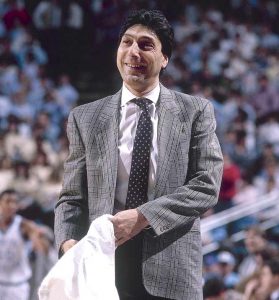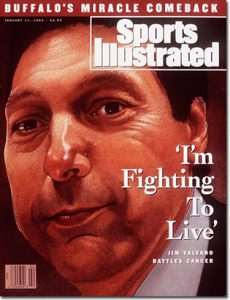 By Meghan Dillon
By Meghan Dillon
When James “Jimmy V” Valvano was seventeen years old, he wrote down his dreams on an index card. On that card, he wrote that he would play college basketball, become a head coach, win a game in Madison Square Garden and, finally, cut down the nets after winning a National Championship.
At age thirty-six, Jim Valvano could take that crumpled index card out of his pocket and cross off everything on the list. He had done it all.
Since I was little, Jimmy V has been my hero simply because his North Carolina State Wolfpack Men’s Basketball team is the greatest underdog story of all time. However, when delving deeper into the various taxonomies and exploring the definition of heroism, I have been able to identify that it is the classic come-from-behind story: someone who once walked among us, as an ordinary person, accomplishing what was deemed impossible.
Jimmy V can be identified as the classic, odds beater/underdog by three heroism scientists named Zeno Franco, Kathy Blau, and Phil Zimbardo. In 2011, these three scholars published a Situation-Based Taxonomy of Heroes. Jimmy V is a true underdog in the way his team won a championships it had no business winning, and in the way he fought cancer with bravery, dignity, and class.
Jimmy was born in Corona, Queens, New York to a middle class family. He would go on to marry his high school sweetheart, and be a loving father to three daughters. Despite his successful coaching career that would require him to be away from his family, his Italian upbringing provided the strong foundation from which  Jimmy V could live out his aspirations. One of the many reasons I see Jimmy V as a hero is that, along the way to accomplishing his dream of winning a national championship, he took on a personal ideology of living that would allow him, a seemingly ordinary man, accomplish things that we see as extraordinary. This ideology would help him to innumerable victories.
Jimmy V could live out his aspirations. One of the many reasons I see Jimmy V as a hero is that, along the way to accomplishing his dream of winning a national championship, he took on a personal ideology of living that would allow him, a seemingly ordinary man, accomplish things that we see as extraordinary. This ideology would help him to innumerable victories.
Sadly, Jimmy V would face an opponent that would be the most challenging of his life: cancer.
One of the features of the Joseph Campbell‘s hero’s journey is the return, in which the hero gives back and shares the knowledge learned from their transition from layperson to hero. Despite all of the incredible things he accomplished while healthy, it was all the things Jimmy V did while sick that solidified his heroism, in my eyes. During the final 10 months of his life, Jimmy V utilized his coaching platform, sharing personal anecdotes and vibrant insight into his life as a patient in hopes of spreading awareness of the disease that has taken so many.
Jimmy V did not shy away from the public eye, as showcased in his ten minute acceptance speech upon receiving the Arthur Ashe Award for Courage at the 1993 ESPY Awards. He was not afraid to show the world the truth about cancer: crying in interviews and struggling to walk. He knew he would lose his final battle in his life after winning so many, but his spirit, charisma, and genuine heart are things that will live on forever.
The best stories in sports are those that transcend the playing field or court. They are the stories of those who climb the latter of success, attaining achievement and, often times, in the most famed stories, coping with the agony of loss. The 1983 NC State Wolfpack has one of the most storied runs of all time. That run is nothing without my hero, Jim Valvano, who could be seen as falling shy of a hero because he lost his battle with cancer.
However, like Jimmy V said, “… That does not mean that you lose to cancer. You beat cancer by how you live, why you live, and in the manner in which you live”.
Below is a clip of Jimmy V’s inspired speech at the 1993 ESPY Awards.
– – – – – – – – – – – – – – – – – – – – – – – – – – –
Meghan Dillon is an undergraduate enrolled in Scott Allison’s Heroes and Villains First-Year Seminar at the University of Richmond. She composed this essay as part of her course requirement. Meghan and her classmates are contributing authors to the forthcoming book, Heroes of Richmond, Virginia: Four Centuries of Courage, Dignity, and Virtue.